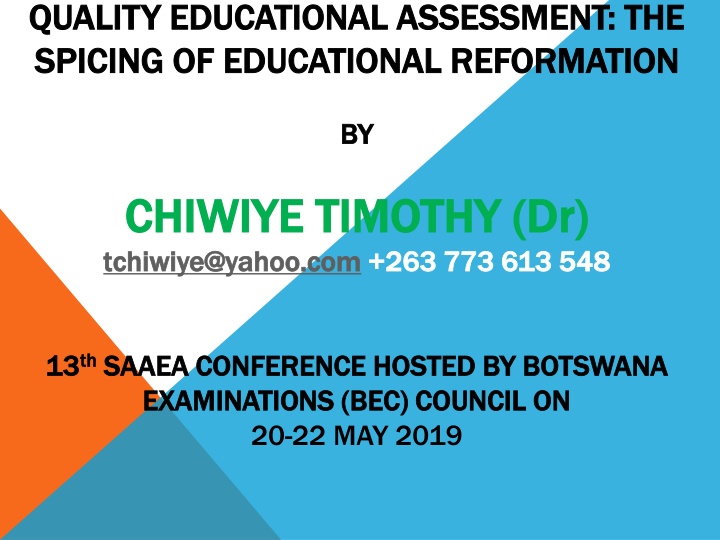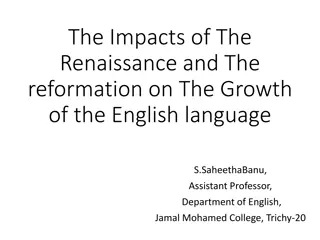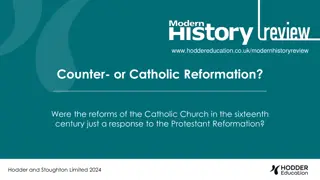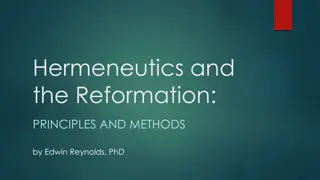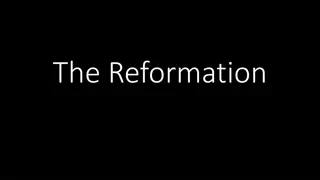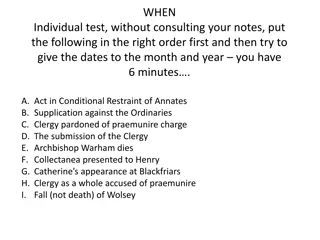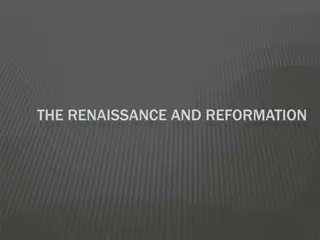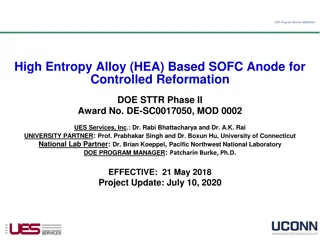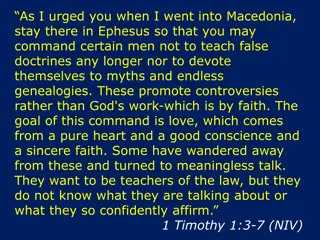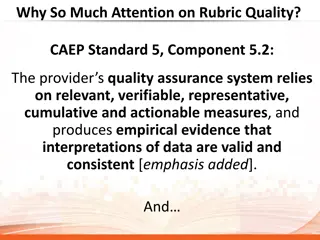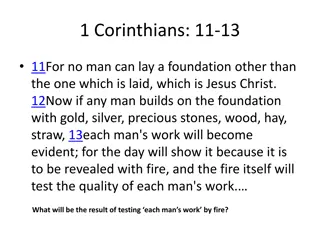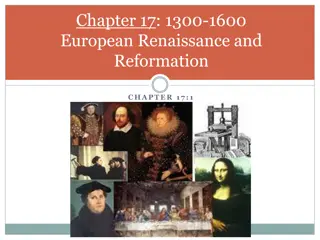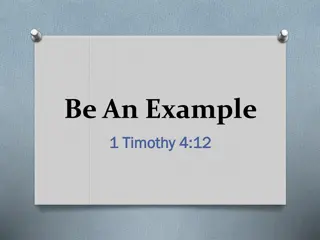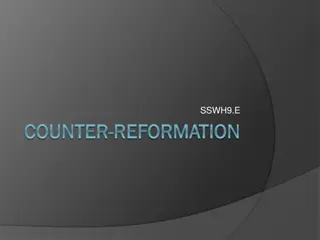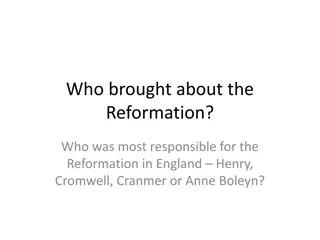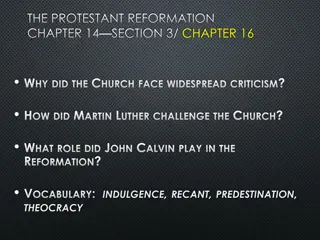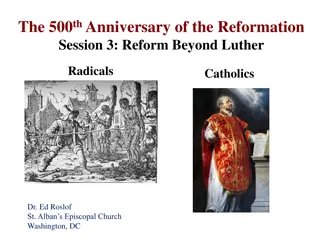Quality Educational Assessment: The Spicing of Educational Reformation by Dr. Chiwiye Timothy
Dr. Chiwiye Timothy delves into the landscape of educational reform, highlighting the diverse ideologies that shape the field. He discusses the resistance to change, the pitfalls of radical reform, and advocates for a needs-driven approach rooted in feasibility studies. Through innovative ideas and ICT frameworks, he aims to make education more inclusive and cost-effective.
Download Presentation

Please find below an Image/Link to download the presentation.
The content on the website is provided AS IS for your information and personal use only. It may not be sold, licensed, or shared on other websites without obtaining consent from the author.If you encounter any issues during the download, it is possible that the publisher has removed the file from their server.
You are allowed to download the files provided on this website for personal or commercial use, subject to the condition that they are used lawfully. All files are the property of their respective owners.
The content on the website is provided AS IS for your information and personal use only. It may not be sold, licensed, or shared on other websites without obtaining consent from the author.
E N D
Presentation Transcript
QUALITY EDUCATIONAL ASSESSMENT: THE QUALITY EDUCATIONAL ASSESSMENT: THE SPICING OF SPICING OF EDUCATIONAL REFORMATION EDUCATIONAL REFORMATION BY BY CHIWIYE TIMOTHY (D CHIWIYE TIMOTHY (Dr r) ) tchiwiye@yahoo.com tchiwiye@yahoo.com +263 773 613 548 +263 773 613 548 13 13th thSAAEA CONFERENCE HOSTED BY BOTSWANA SAAEA CONFERENCE HOSTED BY BOTSWANA EXAMINATIONS (BEC) COUNCIL ON EXAMINATIONS (BEC) COUNCIL ON 20-22 MAY 2019
PRESENTATION OUTLINE The topology of educational reform The topology of educational reform (from players (from players to outcomes) to outcomes) Schools of thought about education in Schools of thought about education in general general Schools of thought about quality and Schools of thought about quality and inclusive assessment and the inclusive assessment and the direction we may take direction we may take
INTRODUCTION The presenter views educational reform as: a political and complex endeavour. there are those ideological stance against reforms and resist any form of innovation and change These are driven by a fear factor and cannot concede to move even an inch. Such a constituent has created pseudo-empires around the ideology and any paradigm shift is perceived a serious threat to the status quo who take a conservative
INTRODUCTION At the other extreme of the continuum: Are those who are obsessed with radical change devoid of context Whose socioeconomic dynamics of the country reforms are not grounded on Whose reform is change for the sake of change, which when subjected to critical analysis, it falls short solutions to consumers problems. from providing
INTRODUCTION On this continuum, this scholar subscribes to a: needs driven reform which precedes a sound feasibility study of the national vision and agenda reform that offers equal opportunities for ALL learners and gives hope to communities at large reform that is anchored on meaningfulness and authenticity, pursuing new innovative ideas, mounting assessment frameworks on home grown ICT platforms to contain runaway costs to achieve cost effectiveness. ALL
CRITICAL QUESTIONS THAT COME TO THE FORE 1.Who are the players or agents of educational reformation? 2.What are the drivers (motivators) of educational reformation? 3.What is the process of reformation like? 4.What informs the timing? 5.What are the anticipated outcomes (product) of this reformation? 6.Do players (agents) consume the product out of their initiated reform?
EDUCATIONAL ASSESSMENT IN AN ERA OF REFORM Behaviourism Behaviourism - - Cognitivism these treat learners as a black box, where inputs into the black box are known and measurable, but what goes on inside the black box is ignored or not considered of interest On the contrary , learners have the ability for conscious thought, decision-making, emotions, and the ability to express ideas through social discourse, all of which are highly significant for learning and must be assessed. Cognitivism
EDUCATIONAL ASSESSMENT IN AN ERA OF REFORM Constructivism emphasises Constructivism emphasises the importance of consciousness, free will and social influences on learning. every changing world of experience in which he is the center. individual exists in a continually The external world is interpreted within the context of that private world. Humans are essentially active, free and strive for world meaning in personal terms.
EDUCATIONAL ASSESSMENT IN AN ERA OF REFORM I believe that knowledge is essentially subjective in nature, constructed from our perceptions and mutually agreed upon conventions A Social Constructivists believe that this process works best through discussion and social interaction, allowing us to test and challenge our own understandings with those of others physical laws exist because they have been constructed by people from evidence, observation, and deductive or intuitive thinking, etc. Educational assessment verifies what constitutes valid knowledge. How? Assessment - assid re (to sit down, Sit by, camp near). Assessment is conceptualised not as a remote endeavour
QUALITY ASSESSMENT THOUGHT nations seized with education reforms, must be quick to infuse in the process the art and science of functional assessment to glamour these reforms. cultural validity in assessment is a critical issue in determining the accuracy of the results and its implications on mastery and instructional practices, Basterra (2011). tests using a single measurement field with complex language results in learners give answers which do not accurately reflect their content knowledge. Multiple assessment measurement can provide valid information about the candidate, (Basterra, 2011, and Gottlieb, 2006).
QUALITY ASSESSMENT THOUGHT Quality assessment procedures and systems must focus on equity concerns to ensure that all candidates are well served Assessment systems have attracted criticisms for their perceived imperfections in measuring achievement. Bias, unfairness and inequities etc are enemies of quality educational assessment Increasing diversity of societies among other factors has increased the need to offer equal opportunities Many of the measures most widely used have established validity and reliability, in some instances, these measures are often used inappropriately and unethically with populations from diverse background, (Kofitse, 2010, Sedlacek and Kim (1995).
EDUCATIONAL ASSESSMENT THOUGHT It is important that the measure be the best it can possibly be and that the diversity of the population must be recognized in developing and/or selecting that measure so that equity and access are maximized, Popham (2002) Diversity validity is assessment. Assessment is creating unjustifiable classes on the economic scale opportunities. critical for accurate instead of equalising
EDUCATIONAL ASSESSMENT THOUGHT Consider Consider reliability vs validity Formative vs summative Uniform models of tests vs individual styles and cultural background The dilemma The dilemma Laudable educational objectives like understating, appreciation, critical thinking, creativity, etc are difficult to measure Rote learning easy to assess has little educational validity Shall we teach only what we cam measure then? If YES , limit curricular to fairly low level objectives- disregard higher order If NO, all that is taught will not be assessed
